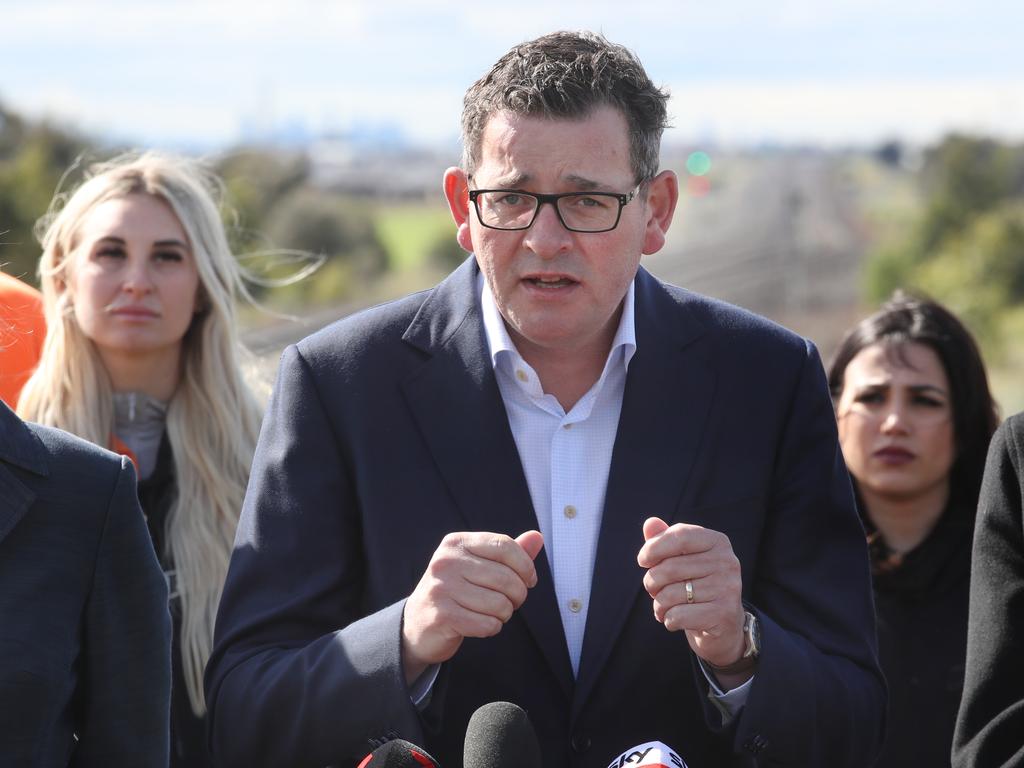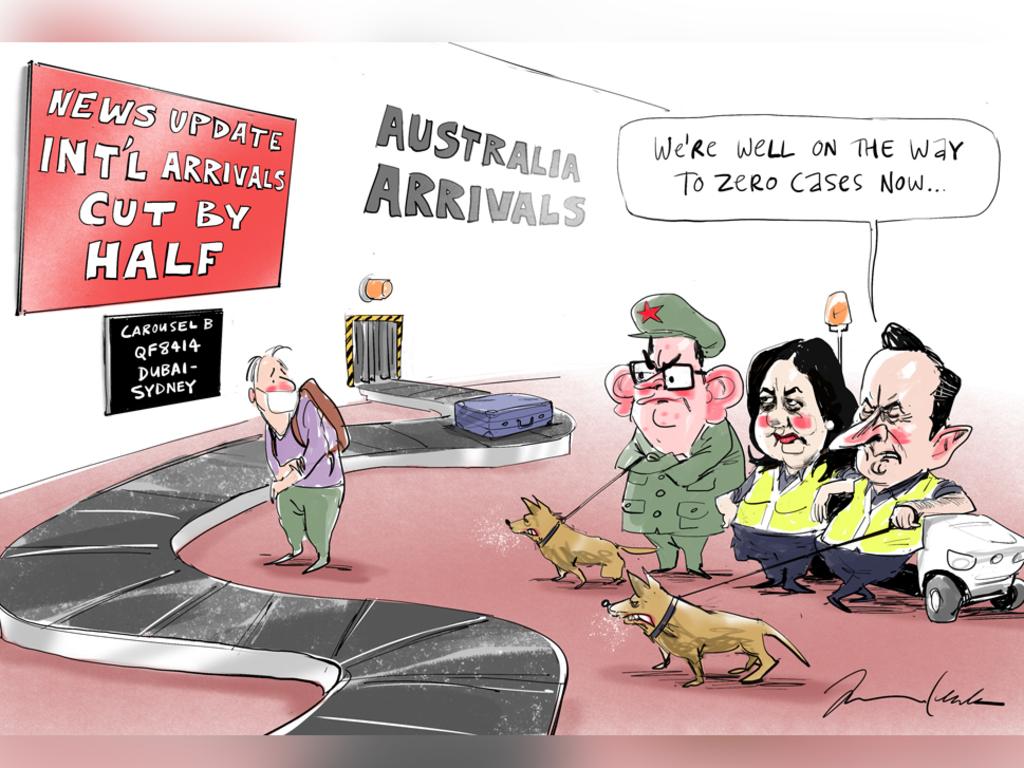
However, the data shows 99.7 per cent of Covid deaths occurred after the Victorian Premier turbocharged the lockdown three years ago this week. Victoria’s Covid toll now stands at 8098, twice as many deaths per capita as the rest of Australia.
Which makes former chief health officer Brett Sutton a surprising choice for Victorian of the Year since the misinformation proffered by the Premier in his daily press conferences was apparently based on Sutton’s advice.
Andrews misinformed Victorians on July 7, 2020 when he said there was “simply no option but to further strengthen the lockdown”. The Premier was wrong to say the alternative was to “finish up like Sydney”. He was ill-advised when he described outdoor children’s playgrounds as “potential transmission sites” and wrong to treat kids like mini grim reapers. The chance that he saved a single life by making Victorians drink beer with their masks on is remote.

Unsurprisingly, however, governments and their agencies are exempt from charges of spreading misinformation under draft legislation designed to stamp out fake news released by the federal government last week. Had the legislation been in place three years ago, it would have given governments far greater powers to control social media and other online platforms.
The haunting image of the arrest of a pregnant woman for a Facebook post is a small taste of what might lie ahead if the Australian Communications and Media Authority is granted the power it seeks to enforce “the code”, an agreement between online platforms to censor harmful misinformation and disinformation.

The definition of “harmful” is broad. It includes “hatred … on the basis of ethnicity, nationality, race, gender, sexual orientation, age, religion or physical or mental disability”, “harm to the health of Australians” and “harm to the Australian environment”. Imagine the size of the woke picnic to be enjoyed on those clauses alone.
Naturally, the ACMA avoids the word “censor” in its 140-page job application, but that is precisely the role it seeks as the adjudicator of what qualifies as misinformation and to offer appropriate “advice” to online publishers.

We are assured the new arrangement will be nothing like Singapore’s Protection from Online Falsehoods and Manipulation Authority, which took effect in 2019. It gives a single government minister the power to declare information posted online is false and order the content’s correction or removal if he/she considers it is not in the public interest. Human Rights Watch has condemned it as a knee-jerk reaction, allowing the government “to harass or prosecute anyone for expressing disagreeable opinions rather than engaging with its critics”.
Nothing like that will happen here, or so they tell us. Yet it has already been happening under the guise of protecting public health.
In May, Chris Kenny revealed in The Australian that the Department of Home Affairs asked digital platforms to remove 13,636 posts, including 4213 related to Covid between 2017 and 2022. Digital platforms such as Facebook, Meta, Twitter, Instagram and Google complied.
It was an audacious example of mission creep. References were made under 2019 amendments to the Criminal Code in the wake of the Christchurch massacre to prevent the dissemination of abhorrent or violent material.
When Julia Gillard wanted to establish a regulatory body a decade ago to keep print and online media outlets in line, the proposal was stoutly opposed by the media, the Coalition and the crossbenches. By contrast, there was barely a squeak following last week’s release of draft legislation empowering the ACMA to combat misinformation. The prospect of government censorship appears not to trouble the media and general public as much as it once did.
The game-changer was the Covid-19 emergency, a threat considered so grave as to justify a degree of censorship previously unimaginable in a liberal democracy such as ours. The terms “misinformation” and “disinformation” became common currency and were ruthlessly policed with the co-operation of much of the mainstream media.

The ACMA’s 2021 report into online misinformation, framed against the backdrop of a pandemic, provides the starting point for Labor’s proposed legislation. The examples of what the authors then considered to be misinformation have not aged well.
This column would be spreading misinformation, for example, if it were to argue that mask-wearing does not reduce the risk of infection, the vaccines were not safe or official government guidelines sometimes strayed from evidence-based best practice. It might be ordered offline for suggesting the dangers of Covid-19 were exaggerated or that most cases of Covid-19 could be prevented or treated with simple remedies.
The ACMA conducted polling to identify the extent to which these supposed heresies had spread. More than one in 10 Australians (11 per cent) were categorised as “misinformed (high)”; that is to say they disputed at least three out of five official views. Three out of 10 were in the “misinformed (low)” category, disputing one or two of the authorised arguments.
Each threshold statement was the subject of extensive debate in scientific journals at the time, though not in the mainstream press. The efficacy of masks is disputed. We know many of the government guidelines were based on pure guesswork and that a not insignificant number of people suffered adverse reactions to the vaccine that were severe or even fatal.

We know the dangers were exaggerated, sometimes deliberately, as revealed by texts from a former UK health minister since made public. We are reasonably confident simple supplements such as vitamin D give a measure of protection and relief.
John Stuart Mill once said: “All silencing of discussion is an assumption of infallibility.” Yet we know from bitter experience that the cabal of health experts and self-interested premiers who sought to control the Covid narrative were all too capable of making grave mistakes.
Catastrophic policy errors are best avoided by robust debate. Scientific progress relies on the ability to refute the consensus. Science ceases to function when freedom is denied. The legislation must be vigorously opposed. Illiberal measures to control online mischief would be far more harmful than the misinformation itself.
Nick Cater is senior fellow at the Menzies Research Centre.








We are not privy to the medical advice that led Daniel Andrews to fence off playgrounds, basketball courts and skate parks to prevent the spread of Covid-19.